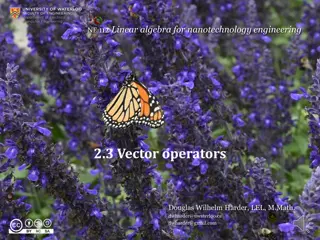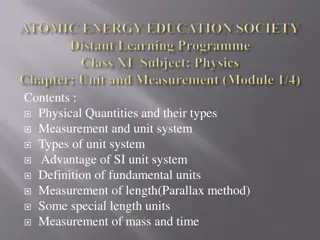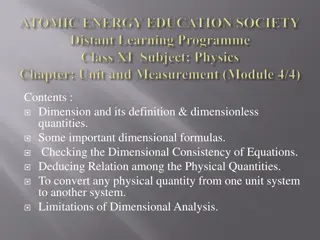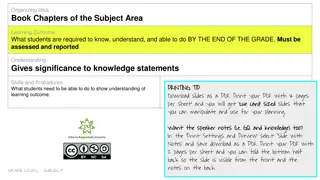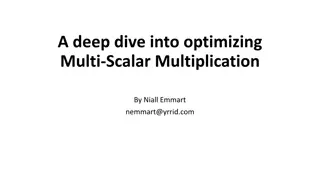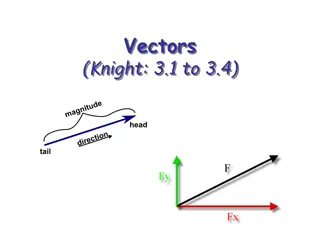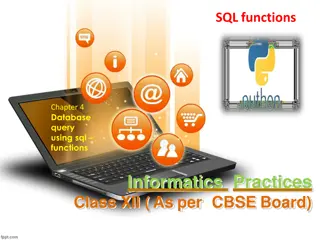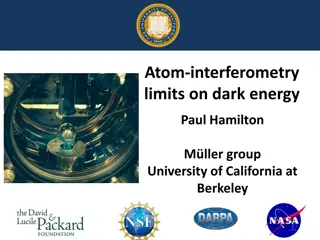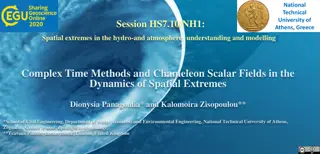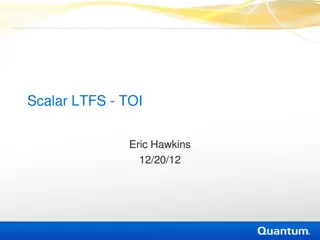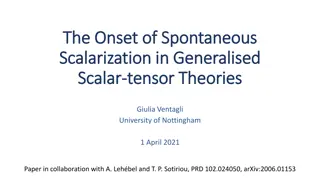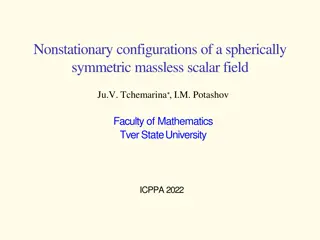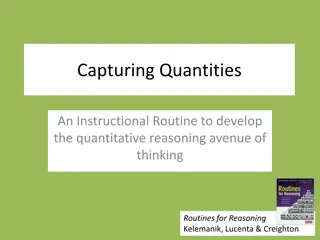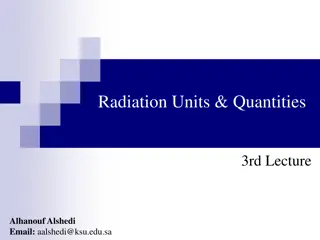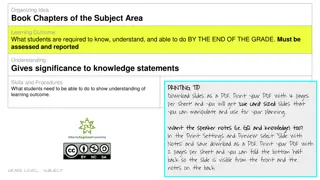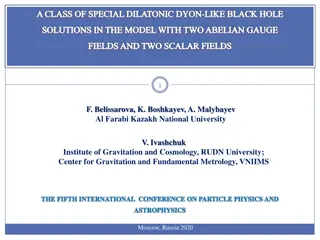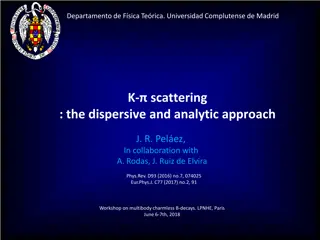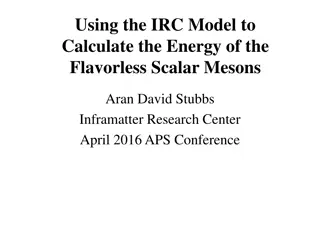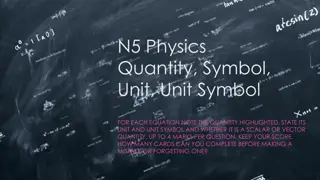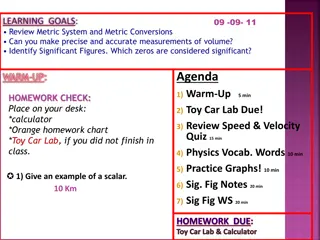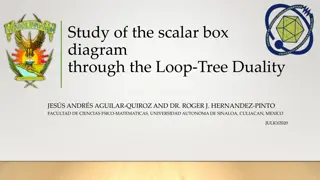Vector Operations in Linear Algebra
Explore the world of vector operations in linear algebra through this detailed presentation. Learn about vector addition, scalar multiplication, field operations, and more. Gain insights into the notation of Fn and the significance of scalar multiplication and vector addition in linear algebra. Whet
12 views • 9 slides
Physical Quantities and Measurement Systems
Physical quantities can be fundamental or derived, and they play a crucial role in describing physical phenomena. Measurement involves comparing quantities with standard units, with fundamental units for base quantities like length, time, and mass. Different unit systems exist, including CGS, FPS, M
7 views • 13 slides
Dimensional Analysis in Physics
Dimensional analysis in physics involves defining dimensions of physical quantities, determining dimensionless quantities, checking dimensional consistency of equations, converting units, and exploring the limitations and applications of dimensional analysis. By understanding dimensions and dimensio
1 views • 14 slides
Quantity Analysis in Grade Two Mathematics
Students in grade two are expected to analyze quantities up to 1000 by understanding natural numbers, place values, even/odd numbers, composition of groups, and estimation techniques. The curriculum emphasizes representing quantities, decomposing numbers, skip counting, modeling even and odd quantit
5 views • 19 slides
Challenges and Solutions in Cost Control and Monitoring for Construction Projects in Ethiopia
Construction projects in Ethiopia often face cost overruns due to variations, delays, underestimations, and incomplete designs. The methodology for cost control under General conditions of contract includes clauses related to Bill of Quantities, changes in quantities, variations, and payment procedu
5 views • 10 slides
IWG Measurement Uncertainties: Justification of Impact Quantities
Explore the justification of main impact quantities in IWG Measurement Uncertainties session held on 6th and 7th October 2020. The analysis includes factors such as deviation from centered driving, start of acceleration, speed variations, load variations, background noise, temperature effects on noi
3 views • 25 slides
Non-Firm Quantities in Electricity Markets
Non-Firm Quantities in electricity markets involve units with non-firm access not being compensated for their non-firm capacity not getting accommodated on the system. The concept of Firm Access Quantity plays a key role in determining compensation levels for units, with differences in implementatio
1 views • 6 slides
Optimizing Multi-Scalar Multiplication Techniques
Delve into the world of optimizing multi-scalar multiplication techniques with a focus on improving performance, especially in Zero Knowledge Proofs systems using elliptic curves. Explore algorithmic optimizations like the Bucket Method by Gus Gutowski and learn about the runtime breakdown, motivati
5 views • 52 slides
Units and Measurements in Physics
Physics is the study of nature and its phenomena, involving various physical quantities like mass, length, time, area, and volume. These quantities can be fundamental or derived, with units selected as standards for measurement. The System International (SI) units offer advantages like coherence, ra
3 views • 14 slides
Exploring Vectors: Magnitude, Direction, and Operations
Delve into the world of vectors, understanding their properties, how to add and subtract them, and determining their components in different coordinate systems. Learn about scalar quantities, vector quantities, the tip-to-tail rule, and the role of unit vectors in calculations.
0 views • 19 slides
SQL Functions for Database Queries
SQL functions are essential elements in performing actions and obtaining results in a database query. They come in two main types: scalar functions and aggregate functions. Scalar functions operate on single values, while aggregate functions operate on sets of data. Examples of SQL functions include
3 views • 14 slides
Independent and Dependent Quantities in Graphical Representation
Explore the concepts of independent and dependent quantities through examples such as an endangered species project and a commuter flight scenario. Learn how to identify and represent these quantities graphically to deepen understanding. Engage in activities like jigsaw puzzles and matching graphs t
3 views • 11 slides
Limits on Dark Energy Using Atom Interferometry - UC Berkeley Study
Research conducted by Paul Hamilton Müller's group at the University of California, Berkeley, focuses on using atom interferometry to explore dark energy. The study delves into screened scalar fields as dark energy, future reach with atom interferometry, known unknowns related to dark energy densit
6 views • 39 slides
Spatial Extremes: Complex Time Methods in Hydro-Atmospheric Dynamics
This study explores the use of complex time methods and chameleon scalar fields in understanding and modeling spatial extremes in hydrological and atmospheric systems. By transforming Lagrangian processes and introducing chameleon scalar fields, the research unveils new insights into the mechanism g
1 views • 9 slides
Scalar LTFS: Best Practices and Key Tips
Explore the fundamentals of Scalar LTFS, a linear tape-based filesystem, including setup, operations, and best practices for efficient usage. Learn about key recommendations such as NFS version 4 on Linux, handling extents, and tape management strategies.
1 views • 12 slides
Tidal Deformability of Compact Stars Admixed with Scalar Fields Research Summary
Researchers like C. J. Horowitz and Kwing-Lam Leung are exploring the effects of dark matter, scalar fields, and ultra-light dark matter on compact stars like neutron stars. Methods involve calculating tidal love numbers, using energy-momentum tensors, and studying equilibrium solutions. The study a
1 views • 20 slides
Transportation and Assignment Problem
Transportation and assignment problems involve optimizing the shipment of goods from various sources to multiple destinations while minimizing total transportation costs. These problems deal with limited supply, known demand, constant shipping costs, and integer quantities. The transportation algori
10 views • 64 slides
Quantities of Food: Countable vs. Uncountable Nouns
Exploring countable and uncountable nouns in relation to food quantities. Learn how to differentiate them, use adverbs for specific quantities, and understand the nuances of some, any, few, and fewer in food-related contexts.
4 views • 11 slides
Spontaneous Scalarization in Gravitational Theories
Spontaneous scalarization presents a unique phenomenon where compact objects experience field growth triggered by tachyonic instability, leading to stable field configurations. Explored in various theories, such as Horndeski gravity and scalar Gauss-Bonnet gravity, spontaneous scalarization is studi
3 views • 18 slides
Nonstationary Configurations of a Spherically Symmetric Scalar Field
Action and stress-energy tensor, Einstein-Klein-Gordon equations, and method for constructing nonstationary configurations of a spherically symmetric scalar field are discussed in this study. The behavior of the characteristic function allows interpretations such as black holes, wormholes, or naked
4 views • 14 slides
Principles of Management According to Fayol
Fayol's 14 Principles of Management include concepts such as centralisation and decentralisation, scalar chain, and order. Centralisation concentrates decision-making authority at the top level, while decentralisation disperses it across management levels. Scalar chain emphasizes the formal lines of
0 views • 29 slides
Developing Quantitative Reasoning with "Capturing Quantities" Instructional Routine
Enhance quantitative reasoning skills with the "Capturing Quantities" instructional routine, which focuses on identifying quantities and relationships, creating diagrams, solving word problems, and reflecting on learning through engaging activities and discussions.
2 views • 9 slides
Radiation Units and Dosimetric Quantities in Radiology
The field of diagnostic radiology relies on various dosimetric quantities and units to measure radiation exposure accurately. From the use of skin erythema dose to principles of ionization chambers, this lecture delves into the importance of understanding and calculating these quantities for effecti
4 views • 25 slides
Grade One Math Learning Outcomes: Quantity Interpretation and Manipulation
Grade One Math curriculum focuses on developing students' ability to interpret and explain quantities up to 100. Students learn to represent quantities using words, numerals, objects, and pictures. They also understand counting principles, such as hierarchical inclusion, and learn to count forwards
4 views • 17 slides
Special Dilatonic Dyon-Like Black Hole Solutions in Two-Field Model
A class of special dilatonic dyon-like black hole solutions in a model with two Abelian gauge fields and two scalar fields is explored. Motivation for the study includes dimensional reduction of supergravity models and manifestations of dark matter. The solutions involve black hole dyon solutions, a
1 views • 12 slides
Analytic Approach to K Scattering and Light Scalar Controversy
The study of K scattering presents challenges in understanding the nature of resonances like the K0*(800) and implications for strange spectroscopy. The light scalar controversy delves into the classification of scalar mesons and the emerging picture of a light scalar nonet. Analyzing data on K scat
0 views • 32 slides
Introduction
Theory of Machines encompasses Kinematics, Dynamics, Kinetics, and Statics, focusing on relative motion and forces within machines. It covers scalar and vector quantities, units of measurement, and representation methods for vectors. Additionally, the addition and subtraction of vector quantities ar
2 views • 28 slides
Calculating Energy of Scalar Mesons Using IRC Model
Deriving the energy of flavorless scalar mesons through the IRC model offers valuable insights into particle physics. The research conducted by Aran David Stubbs at the Inframatter Research Center and presented at the APS Conference in April 2016 sheds light on this intriguing subject. The study pro
3 views • 12 slides
Physics Equations Highlighted with Units and Scalar/Vector Indication
Explore key physics equations with highlighted quantities, units, symbols, and whether they represent scalar or vector quantities. Gain a deeper understanding of fundamental physics concepts through clear visual representations.
0 views • 65 slides
Scalar Wave Transformation Analysis and Solutions
Scalar wave transformation involving incident waves and orthogonal functions are explored. Derivations, integrations, and coefficient determinations are discussed in detail. Solutions for when x=0 and properties of the scalar functions are also addressed.
1 views • 19 slides
Physics Classroom Agenda: Scalar Example, Significant Figures, SI Units
Explore a physics classroom agenda covering topics such as scalar quantities, significant figures, SI units of measurement, and quantitative data. Dive into position-time and velocity-time graphs, learn about precision in measurements, and understand the use of SI prefixes. Get insights into quantit
0 views • 22 slides
Physical Quantities: Scalar vs Vector in Motion
Physical quantities like distance, displacement, speed, acceleration, time, and more play a crucial role in understanding motion. Learn about scalar and vector quantities, their definitions, differences, and key points to remember in this insightful discussion.
0 views • 5 slides
Scalar Potential in Electricity and Magnetism
Explore the concept of scalar potential in the context of electricity and magnetism, revealing its relation to the electric field, conservative forces, and the static nature of systems. Learn how scalar potential influences the behavior of electric fields and discover its connection to concepts like
2 views • 14 slides
Scalar vs Vector Quantities in Physics
Explore the differences between scalar and vector quantities in physics, including examples and illustrations to help differentiate them. Learn about magnitude, direction, vector representation, and more.
0 views • 34 slides
Study of Scalar Box Diagram via Loop-Tree Duality Theorem
Explore the analysis of the scalar box diagram using the Loop-Tree Duality theorem to understand the origins of singularities. The work delves into N-particle scalar one-loop integrals, massless scalar box integrals, dual representations, and parametrization of momenta to compute integrals efficient
4 views • 14 slides
Multipole Moments and Tensor Quantities in Physics
Explore the concept of multipole moments and symmetric tensors in physics, focusing on the expansion of potential, characterization of charge distribution, and the number of independent quantities. Learn about the relationships between various tensor quantities and their implications in field calcul
1 views • 18 slides
Understanding Scalar and Vector Quantities in Physics
Learn about scalar and vector quantities in physics, understand the difference between them with examples, and explore the units for speed, mass, weight, force, and distance. Dive into drawing scale diagrams for representing vector quantities and enhance your knowledge in physics concepts.
1 views • 10 slides
Basics of Vectors: Scalars, Vectors, and Unit Vector
Scalar quantities have magnitude only, while vector quantities have both magnitude and direction. Unit vectors have magnitude of 1 and direction. Vector addition and subtraction involve combining vectors component by component. Various rules and laws govern vector algebra.
2 views • 11 slides
Understanding Electrical Quantities in Physics
Learn about essential electrical quantities in physics, including EMF, voltage, current, resistance, and their measurements. Explore the relationship between these quantities and how they affect electric circuits. Master key concepts through comprehensive explanations and practical examples.
3 views • 65 slides
Gravitational Waves and Scalar Clouds Study
Explore the research on gravitational waves and scalar clouds in extreme mass-ratio inspirals within the Department of Physics and Astronomy at Ghent University. Follow the progress, calculations, and next steps of the study, focusing on LISA, scalar field amplitude, and results of scalar power anal
1 views • 9 slides
